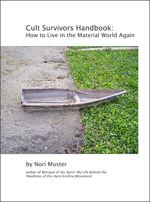Note To Abusers
 [An] unfortunate dilemma belongs to the perpetrator. These people must
find compassion for their victims, stop hurting people, and make
amends before they can get anywhere. They may have been hurt once
too, but they still have a responsibility to stop the cycle of
abuse. Here are some ways to tell if you're a perpetrator: if you've
ever hurt people when you were in the grips of an addiction or
uncontrolled anger; if your actions have ever resulted in emotional
hurt, material damage, physical pain or humiliation for another
person; or if there are consequences to your anger, such as losing a
job, a spouse, etc.
[An] unfortunate dilemma belongs to the perpetrator. These people must
find compassion for their victims, stop hurting people, and make
amends before they can get anywhere. They may have been hurt once
too, but they still have a responsibility to stop the cycle of
abuse. Here are some ways to tell if you're a perpetrator: if you've
ever hurt people when you were in the grips of an addiction or
uncontrolled anger; if your actions have ever resulted in emotional
hurt, material damage, physical pain or humiliation for another
person; or if there are consequences to your anger, such as losing a
job, a spouse, etc.
Another way to perpetrate abuse is through passive-aggressive behavior. This happens when you commit a crime of omission. An example would be withholding letters or information; taking responsibility for a task and then failing to complete it (especially when you know this will get someone else in trouble); or negligently allowing someone else to suffer abuse that you could have stopped. Sometimes passive aggressive acts are performed knowingly; other times it seems the person thought it out on the subconscious level.
Perpetrators' issues are more complex than victims' issues. Perpetrators need to tell their stories but for a different reason. Internal denial allows the perpetrator to minimize or rationalize the harm they have done. If they tell their stories honestly and thoroughly, they will be amazed at people's disapproval. They need this honest feedback to finally realize that what they did was wrong. When they realize how much they hurt people, then they will be ready to work with some of the concepts in this book.
Perpetrators need a qualified counselor to walk them through the hell that they have created for others in their wake. Good counselors will help them become better people. An unqualified counselor may prompt a perpetrator to forgive himself too soon, which just feeds denial mechanisms. Therefore, the wrong advice at a critical time can just make a perpetrator worse. This is one reason they say sociopaths never change.
Read more about how to tell if you're a
perpetrator »»
Read more about making amends »»
Read more about perpetrators »»
